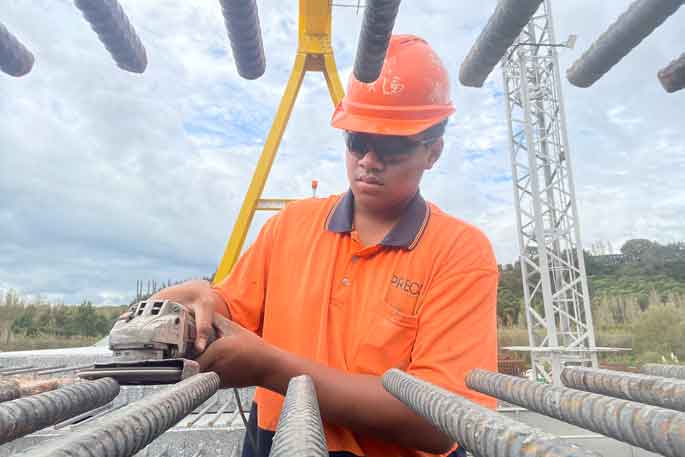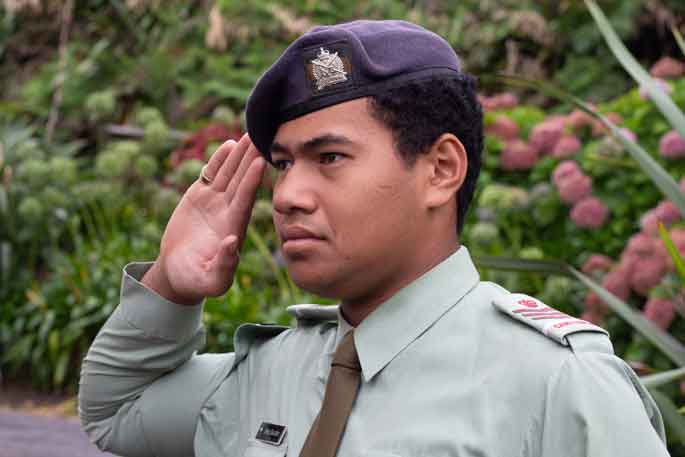They're sought-after. They're a step ahead. They're NZ Cadet Forces.
'When a cadet meets a prospective boss, they're at an advantage,” says Squadron Leader Tony Young, area support officer for the Bay of Plenty Cadet Unit. 'Bosses love them.”
Pilimilose Sanalio can vouch. Because that was exactly his experience.
'They saw ‘cadets' on my CV,” says the 18-year-old cadet staff sergeant. 'They asked about it, liked it and I got the job.” He does precast concrete work with Preco at Tauriko. His fingerprints are all over those huge beams on the Bayfair overpass.
Tony says there are good reasons employers like cadets. 'They know the cadet will be self-motived, confident and disciplined. They will bring people and time management skills, they'll be well presented, they will be respectful and the employer knows they will turn up on time.”
Pilimilose – ‘Lose', pronounced ‘Loss-eh' for short – ticked that box by arriving exactly two minutes early for his interview with The Weekend Sun.
'They are skills a lot of kids have, but through cadet training, they are developed to a greater degree and earlier,” says Tony.
There are 74 cadet personnel across the corps in Bay of Plenty – TS Chatham, the sea cadets, Western Bay of Plenty Cadet Unit, the army cadets and No.16 (City of Tauranga) Air Training Corps; the air cadets.
Opportunities
'Covid-19 affected recruitment, so there are now opportunities for 13-to-18-year-olds to experience a range of outdoor activities and develop leadership qualities,” says Tony. 'A military-flavoured development programme cadets can use in life while having fun.” So this is a membership pitch.
There's the drill – the dress and bearing skills required to stand tall in public. There is bush craft and survival skills, first aid, skills in presenting yourself and speaking in public, navigation and firearms training and marksmanship, and recreational and physical training. And, of course, there is the corps specific training – sea, land and air.
'You actually watch these skills evolving,” says Tony. 'It's very rewarding, very humbling.”
Some kids arrive at cadets and may be shy, withdrawn and lacking confidence. 'I was that person,” says Lose, the cadet staff sergeant. 'Now I can stand up in front of a group of strangers and talk to them like I know them. That's pretty good.”
A career in the military is not a pre-requisite. However…'I have always wanted to join the army,” says the young cadet staff sergeant.
He devoured war movies as a kid, and aged 14 joined the cadets to get a sense of military life. 'It just made me love the army idea even more.” He's thinking ‘armoured' – the LAVs or Light Armoured Vehicles, part of the crew.
And a trade on the side. 'Building, so I have something when I come out of the army. At just 18, cadet staff sergeant Pilimilose, aka Lose, Sanalio, pretty much has a template for life.
Different ambulance
A former judge once described the Youth Court as an ambulance at the bottom of the cliff waiting to deal the worst child offenders when they turn 14 – the ram-raiders, smash-and-grabbers, burglars, thieves and violent offenders. However, at the top of the cliff with its klaxon blaring and emergency lights flashing is another ambulance – the NZ Cadet Forces. 'We're not geared to deal with the really ‘bad asses' but we can provide an opportunity to those wishing to change, to turn their lives around. We can provide an alternative to the dark path,” says Tony. 'And some of those bad asses have been saved by cadets.”
And from the dark path, there are stories of redemption and success. 'One local guy experienced family violence, and there were gang connections. He joined cadets, responded to the direction and discipline and is now in the military.” It could have easily been very different for him.
Another young guy from the suburbs with gang associations joined cadets and is now a prominent businessman. 'We will partly lay claim to that success,” says Tony. 'We gave him an opportunity, introduced him to discipline and self-improvement. We gave him a pathway, set boundaries and he responded.”
Tony says every kid starts out a good kid – it's their environment that provides them the challenges. Cadets is a way out for these kids.
'If I met one of those people, I'd simply ask
him what he was doing Thursday night,” says Lose. Thursday night being parade night, 6pm-9pm at the Army Hall at the intersection of 11th Ave and Devonport Rd. 'We'd look after them, give them some tools. You never know, they might like some discipline and direction, some character development.”
Inclusivity
And there's a small matter of inclusivity. 'Yes, there are LGBTQIA+ cadets. They join for much the same reason as any other kid. They want to have fun with peers, push their boundaries, learn self-discipline. There may be challenges but nothing that is insurmountable.”
And they are well accepted and supported by heterosexual cadets. 'It is a very positive aspect of youth society – they are a lot more accepting than their parents' and grandparents' generations.” And after all, they all wear the same uniform.
Lessons learned in cadets are lessons not forgotten. Like respect. 'You will catch up with a cadet later in life and they will still call you ‘Sir'. I remind them they are out of cadets now and my name is Tony. And they will reply ‘Okay Sir'; that's cool! They still respect what you and the cadets have done
for them.”

By day: Pilimilose Sanalio, the concrete worker. Photo: supplied.

